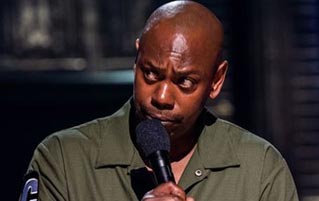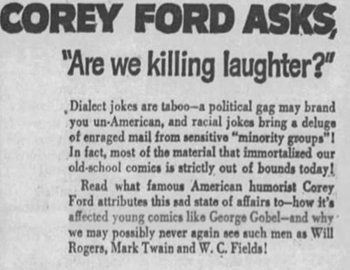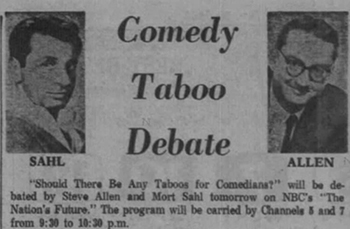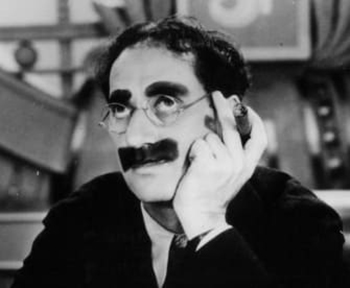Is Asking 'Is PC Culture Killing Comedy?' Killing Comedy?

There's been a lot of discussion lately about whether "PC culture" is "killing comedy," what with a controversial Dave Chappelle special, Saturday Night Live reversing its decision to hire Shane Gillis, and whatever new routine Rob Schneider is performing for his bathroom mirror. And it's dumb. It's a dumb conversation. Mainly because it's nothing new. This debate seems to pop up every few years, like a Halley's comet composed entirely of bullshit.
Are people today too sensitive? Can comedy even exist in this climate? As comedy historian Kliph Nesteroff and Luisa Diez, host of the Why You Mad? podcast, pointed out on Twitter, people were asking these same questions throughout the entire 20th century. Like columnist Corey Ford, who in 1958 asserted that society was "killing laughter." Why? Because "out of bounds" material, such as "racial jokes," were now off the table thanks to "minority groups." Because of these snowflakes, Ford claimed, "we may possibly never see again such comedy geniuses as Will Rogers, Mark Twain and W.C. Fields!" Or as they're known to young people today, two dead guys they've vaguely heard of and a dead dude who wrote a book they pretended to read in junior high.

There were even televised debates on the subject, featuring young whippersnappers ... Mort Sahl and Steve Allen.

Which isn't to say things haven't changed. They have. But for the most part, comedians are freer today than ever before. While today a controversial statement could make a comic the target of online harassment or cost them certain career opportunities, in the past, comedians faced legitimate legal repercussions for their routines. Not just in famous cases, like with Lenny Bruce and George Carlin, but also with lesser-known comics. Like the bawdy Belle Barth, who crooned about "banging" before William Hung was even born.
She was sued for $1.6 million by two teachers who said her act "corrupted them morally." And then there's George "Hoppy" Hopkins, who was literally grabbed by an audience member so offended that he decided to perform a citizen's arrest and haul the poor guy off to jail.
Which is why it's so baffling that certain comedians keep dredging up this argument. Some of the most prominent critics of today's PC culture faced way worse cultural obstacles decades ago. Take Mel Brooks, who argued that most of his movies could never be made today because "we have become stupidly politically correct, which is the death of comedy." We love Mel, but this statement is a tad surprising, because his career was nearly ruined by political correctness in 1967!
Brooks' directorial debut, The Producers, was almost a total disaster due to its controversial (i.e. Hitler-filled) plot. For one thing, it nearly didn't star the legendary Zero Mostel because Mostel's agent thought the script was too offensive to send him. And the film initially bombed at the box office. Critics called it "vile" and "tasteless" to parody Hitler "only 23 years after the end of World War II." Today it's considered a comedy classic, and the stage adaptation holds the record for most Tony Award wins (Broadway's celebration of excellence, not the crudely made trophies Tony Danza hands out in his basement).
Jerry Seinfeld famously said, "There's a creepy, PC thing out there that really bothers me," adding that he won't play colleges anymore because they're "so PC." But even Seinfeld (whose act was only ever controversial amongst members of the airline peanut industry) has contended with cultural pushback far greater than a few sophomores who weren't bowled over by his bit about how cellphone users look like "a gay French king." During the production of Seinfeld, NBC forced him to cut a scene wherein George remarks that he's "never seen a black person order a salad." And the network had to publicly apologize to the Puerto Rican community after Kramer burned their flag in the penultimate episode. "The Puerto Rican Day" was so controversial that it was even pulled from Seinfeld's syndication package, and didn't air again until five years later.
Then there's John Cleese, of the legendary Monty Python and the less legendary Beethoven's Christmas Adventure. Cleese, like Seinfeld, won't perform at colleges anymore, and he remarked that comedy was "easier when people weren't so uptight about everything." Which is especially shocking considering the backlash surrounding the Monty Python's Life Of Brian. In countries throughout Europe, the film was either rated X or straight-up banned for its religious subject matter. In the U.S., there were even protests. You'd think Cleese of all people would think that people are less uptight today, because in the intervening 40 years, Life Of Brian has been embraced as classic, inspired an oratorio that was performed at Carnegie Hall, and even called a "remarkable tribute to the life of Jesus" by a recipient of "the Vatican's top theological award."
Of course, while attitudes toward crucifixion-themed humor have relaxed, tolerance for other types of jokes has waned, if not disappeared completely. That too is nothing new. What is considered acceptable in comedy is always progressing with the times. For example, before it was a thing future Canadian prime ministers spent a surprising amount of time experimenting with, blackface was a huge part of the vaudeville circuit. Even Bob Hope was a blackface comedian, only abandoning the practice because he missed his streetcar one day and didn't have time to slather on facepaint before a big show.
It wasn't just blackface. Racist caricatures like "The Merry W*p" were commonplace in vaudeville (remember, Italians didn't always count as white). Not because nobody was offended, but because the offended had "few places for their grievance to be heard." One notable former vaudevillian eventually "waged a battle to have racial caricature erased from vaudeville." Who was this oversensitive SJW? This guy:

Yeah. Groucho Marx specifically called out two vaudevillians whose entire schtick involved racial stereotypes. They defended themselves by arguing that racial caricature "if done well is not offensive," and that no "Scots" or "Swedes" had ever complained. Groucho fired back: "The Sandy McPhersons and Yonny Yohnsons were not a minority being subjected to oppression, restriction, segregation or persecution."
Then there's George Carlin, a comic who's often cited by folks complaining about oversensitiveness in comedy today. Carlin called political correctness "American's newest form of intolerance." But Carlin, like Groucho, was outspoken on the issue of comedians punching down. In a 1990 interview that recently went viral, Carlin talked about the controversy surrounding Andrew Dice Clay. Carlin defended his right to free speech, but added, "His targets are underdogs, and comedy has traditionally picked on people in power, people who abuse their power. Women and gays and immigrants, to my way of thinking, are underdogs." He also noted that it seemed like Clay's "core audience young white males who are threatened by these groups."
The point is that comedy has always been evolving, and not without the efforts of people speaking out against certain attitudes or prejudices. Recently, The Hangover director Todd Phillips claimed that he had to make a killer clown movie simply because people can't "be funny nowadays with this woke culture." Phillips' comments were almost immediately challenged by Joker actor Marc Maron, who echoed Carlin's sentiment: "There's plenty of people being funny right now ... the only thing that's off the table, culturally, at this juncture -- and not even entirely -- is shamelessly punching down for the sheer joy of hurting people ... For the sheer excitement and laughter that some people get from causing people pain, from making people uncomfortable, from making people feel excluded."
Those complaining about how progress is at odds with comedy are each but one spoke in the great wheel of history's boring-ass whiners. Comedians should know better, but some of them seem to be mistaking what they consider "edgy" material for simply being kind of old and out of touch. Jerry Seinfeld's "gay king" bit wasn't leading some new comedic vanguard. If college students weren't laughing, it's probably because they didn't find it the musings of a coffee-obsessed millionaire in his mid-60s as funny as some tweet they just read.
Comedians should be able to tell the difference between dated material and provocative brilliance. Patton Oswalt publicly expressed regret for a "lazy" routine on his first album about "gay r****ded people." He didn't vigorously defend it on the principle of free speech, because ultimately he knew it was a shallow bit created for an "easy laugh." But the lazy comics aren't acting alone here. The have co-conspirators in a lazy media. Specifically, any journalist who poses the question "Is Killing Comedy?"




Want to keep comedy alive? Actually go to your local club once in a while.
You (yes, you) should follow JM on Twitter!
For more, check out Stand-Up Comedy Pro Tips - New Guy Weekly:
Also, we'd love to know more about you and your interesting lives, dear readers. If you spend your days doing cool stuff, drop us a line at iDoCoolStuff at Cracked dot com, and maybe we can share your story with the entire internet.
Follow us on Facebook. If you like jokes and stuff.